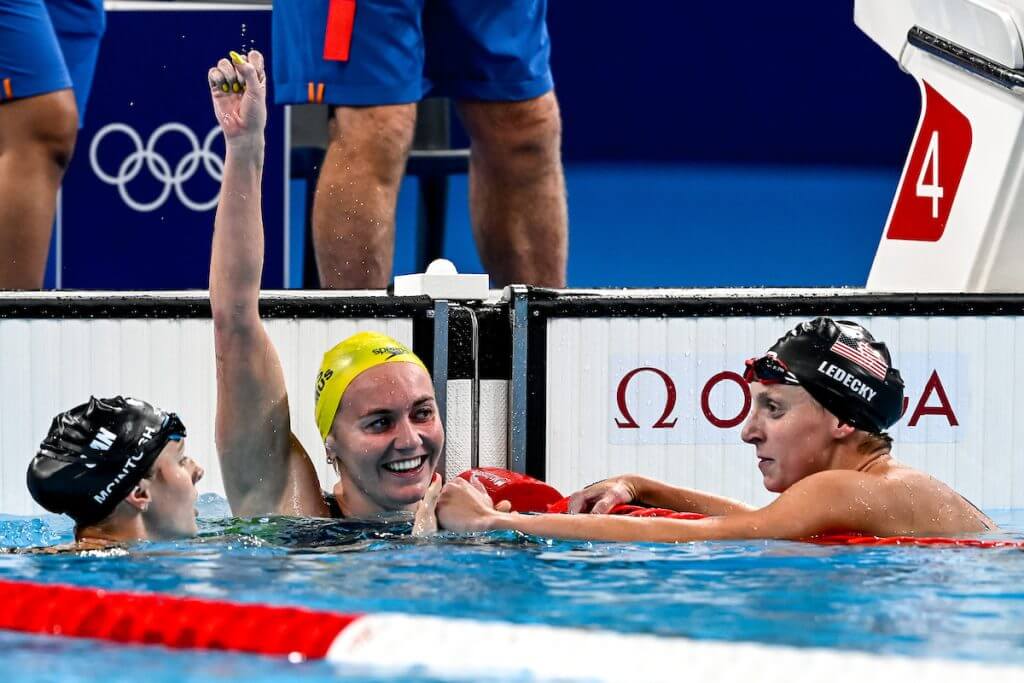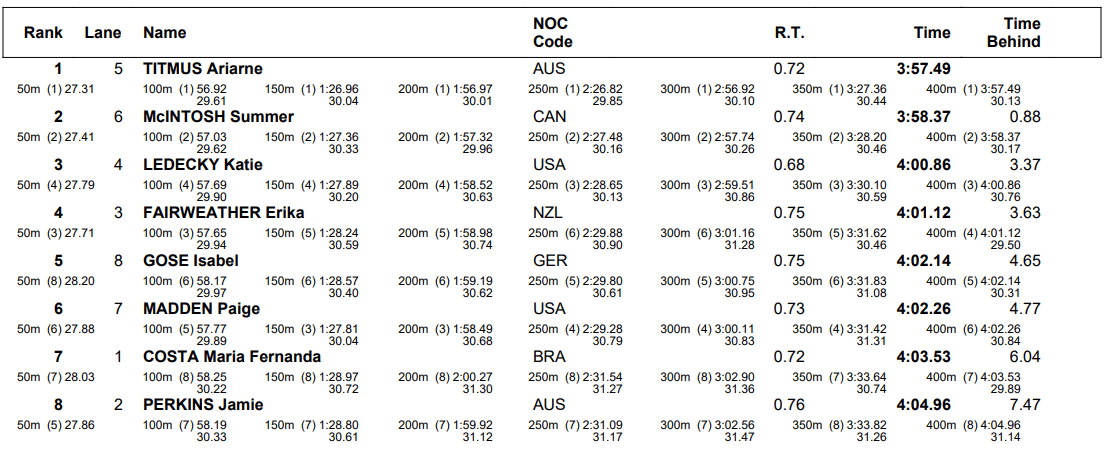Paris Olympics, Day 1 Finals: Ariarne Titmus Pulls Away From McIntosh, Ledecky to Secure Repeat 400 Freestyle Gold

Paris Olympics, Day 1 Finals: Ariarne Titmus Pulls Away From McIntosh, Ledecky to Secure Repeat 400 Freestyle Gold
With the first women’s swimming gold medal of the Olympic Games set to be decided over the ensuing four minutes, standing behind starting blocks in adjacent lanes were three heavily-accomplished swimmers, all essentially national heroes in their country of origin. With respective ages of 27, 23 and 17, the three women entered the Olympics at vastly different stages of their careers but all with similar ambitions of massive accomplishments this week in Paris. They dove off the blocks and raced a final anticipated by swimming enthusiasts for years.
Lane four was Katie Ledecky of the United States, a swimmer who has taken freestyle to never-before-seen heights over the last 12 years. Next to her was Australia’s Ariarne Titmus, the first woman to bridge the gap to Ledecky in one of her signature events and now the defending Olympic champion and world-record holder. And on the other side of Titmus stood Canada’s Summer McIntosh, who finished fourth in this event three years ago as a 14-year-old and has since blossomed into a multi-time world champion and world-record holder.
Race of the century? Hardly. Not with Titmus unleashing domination right off the gun.
The Aussie flipped a tenth clear of McIntosh at the 50-meter mark. Catch up with the fast-finishing Australian? Unlikely for anyone, even swimmers as accomplished as McIntosh and Ledecky. Indeed, Titmus was out-split on exactly one of the eight 50-meter lengths. Flipping at 1:56.97 at the halfway point, the world record was in range throughout, but Titmus would not find the same gear she used on the way to her top time of 3:55.38.
Titmus finished in 3:57.49, the ninth-quickest effort in history and a mark that only she, McIntosh and Ledecky have ever surpassed.
“I feel relieved. It’s a different feeling it again after the first time. I know what it takes to be an Olympic champion, and I know how hard it is racing in these circumstances at an Olympic Games. It’s not really like anything else. The noise and atmosphere and pressure and (Olympic) Village life definitely makes performing well hard, but it feels really nice to come out on top,” Titmus said.
“I felt pretty good the whole way. I have no idea what my splits were. I definitely started to feel it in the last 100. I left everything out there.”
McIntosh finished in 3:58.37 to clinch her first Olympic medal in what is expected to be a busy week for the young Canadian, who will also race both individual medley races plus the 200 butterfly.
“It’s definitely pretty surreal. Going into tonight I really just wanted to put my best foot forward and race as hard as I could. Overall I’m pretty happy with the result,” McIntosh said. “An Olympics is always pretty nerve-racking and there’s a lot of anticipation going into each race, so (I’m) kind of learning how to deal with that and also trying to feed off the crowd.”
Bronze went to Ledecky in 4:00.86, two-and-a-half seconds short of the 3:58.30 she clocked at the U.S. Olympic Trials but good enough to secure the 11th Olympic medal — and interestingly, first bronze — of her career.
Ledecky was never ahead of the top-two, battling New Zealand’s Erika Fairweather and American teammate Paige Madden for third place through much of the race. She was one-and-a-half seconds ahead of Fairweather heading into the final length, and she needed almost that entire advantage as Fairweather closed in 29.50 on the way to a final time of 4:01.12. Germany’s Isabel Gose took fifth in 4:02.14, just ahead of Madden’s sixth-place time of 4:02.26.
“It feels good. I would’ve liked to have been a little faster tonight. Been faster a few times this season, but you can’t complain with the medal. Happy to get the medal and get two days of rest and try to be better the rest of the week,” Ledecky said.
“There are always things I want to do better, even in my great races. There’s a lot of things I would like to do better. I looked at my splits, there was nothing horrible. I didn’t have it the last 200, 250 like I wanted to… I just couldn’t kick into that next gear I wanted to finish it out. It was such a good field, there was a chance I could not have gotten a medal. I’m grateful for that.”
- World Record: Ariarne Titmus, AUS – 3:55.38 (2023)
- Olympic Record: Katie Ledecky, USA – 3:56.46 (2016)
- Tokyo Olympic Champion: Ariarne Titmus, AUS – 3:56.69
With the victory, Titmus became only the second Australian to ever successfully defend a gold medal in an individual swimming race and the first to do so in a whopping 60 years. Previously, only Dawn Fraser had won on successive occasions, capturing gold in the 100 free in 1956, 1960 and 1964. Generations of legendary Australians missed out on this feat, most notably Susie O’Neill, who was upset in her quest for a repeat in the 200 butterfly in front of a home crowd at the Sydney Games.
“I can’t really believe that’s me, to be honest,” Titmus said. “I just think of myself as so normal. I love swimming, and I love getting out and representing our country and having fun. I hope no one looks at me any differently. I’m the same old goofy Tazman girl out here living my dream, and I hope it goes to show that anyone can do what they want to do if they work hard and believe in yourself.”
Of course, this performance by Titmus comes with a small asterisk, given that the gap between the pandemic-delayed Tokyo Olympics was just three years as opposed to the usual four. Still, Titmus deserves plenty of credit as she opened the swimming competition in ideal fashion for Australia’s women, a group looking to back up a brilliant performance at the 2023 World Championships that included eight gold medals.
The Ledecky-Titmus matchup had been one of the centerpiece races of the Tokyo Olympics three years ago after Titmus came up just short of Ledecky’s once-insurmountable world record one month before the Games. Their duel brought out the best in Ledecky, with the American recording her second-fastest performance ever but unable to match the Aussie’s incredible finishing speed.
Less than a year later, Titmus would take over the title of world-record holder, but that’s when McIntosh arrived as a legitimate contender to the dynamic freestyle duo. In early March 2023, McIntosh swam a time of 3:56.06 (her best time by three seconds) to take down Titmus’ world record. Two superstars in the 400 free had become three.
Before Paris, that group would clash at the Worlds in Fukuoka, but that race fizzled out moments out of the start. Titmus took charge that evening, retaking the world record by more than a half-second. Ledecky took silver while McIntosh never approached her own quickest pace and ended up falling to fourth, with Fairweather making her maiden voyage under 4:00 to grab the final podium spot.
Turns out that World Championships final was an accurate preview for what would unfold on a different continent one year later as Titmus reaffirmed her dominant status over 400 meters.


- EVENT PAGE
- SCHEDULE
- VENUE
- STREAMING INFO
- DAY 1 PRELIMS RESULTS
- DAY 1 FINALS RESULTS
- DAY 2 PRELIMS RESULTS
- DAY 2 FINALS RESULTS
- DAY 3 PRELIMS RESULTS
- DAY 3 FINALS RESULTS
- DAY 4 PRELIMS RESULTS
- DAY 4 FINALS RESULTS
- DAY 5 PRELIMS RESULTS
- DAY 5 FINALS RESULTS
- DAY 6 PRELIMS RESULTS
- DAY 6 FINALS RESULTS
- DAY 7 PRELIMS RESULTS
- DAY 7 FINALS RESULTS
- DAY 8 PRELIMS RESULTS
- DAY 8 FINALS RESULTS
- DAY 9 FINALS RESULTS




Good onya Arnie!
Ofcourse Dawn Fraser should and would have made it 4 in a row as she was doing faster times in 1968 than the American winner. But petty bureaucracy of Aussie swimming officials kept her out of the Olympics.
Have to say I expected all medallists to be under 4min. But both Titmus and Ledecky (pronounced Leh-Dets-Skee) were a couple seconds slower than respective Trials.
I bet that McIntosh now wishes she’s in the 800m, as she’d certainly scare the American! Pity Fairweather didn’t match her PB ,that would have meant an Olympic Bronze.
Interesting facts speaking of 1968 and petty bureaucracy I researched and found that Canada’s 1968 17 year old teen sensation Elaine Tanner was not entered in the Butterfly her times would have won Gold back then…but that was 56 years ago hopefully things have changed for the better in the great white North
The article contains a glaring error in saying “Titmus became only the second Australian to ever successfully defend a gold medal in an individual swimming race and the first to do so in a whopping 60 years.”
It would be true if it said Australian woman. Perkins, Hackett and Thorpe all successfully defended their olympic titles.